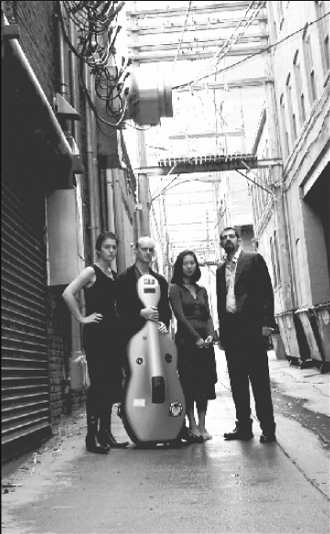By Michael Clive
The Chiara string quartet, classical’s indie innovators
Caffé Vivaldi, which hosted the four young musicians comprising Chiara for a 7:30 set last Thursday evening, is tucked away in a cozy storefront on Jones Street off Bleecker. The diminutive club is best known as an indie music venue, the kind of place where you’d expect to encounter Witches in Bikinis, the group featured in the free fanzine at the door.
Chiara, on the other hand, is a string quartet, classically trained with a repertoire to match. As soon as they began their opening work, the introduction to Jefferson Freedman’s String Quartet No. 3, the quality of their musicianship was evident in their energetic playing, which skittered and buzzed with a seemingly electric pulse. I didn’t know this modern work, but the sound drew me in.
Apparently, it had the same effect on people outside the club, who stopped and stared through the glass as if they couldn’t quite believe what they heard: unmistakably classical, unamplified, high-caliber playing…in a club. Some passers-by actually came in and tried to find an empty seat, which wasn’t easy.
If the hip modernity of the Freedman left any doubt regarding what was in store, the next offering erased it: the final movement of Mozart’s K465 string quartet — vintage chamber music, the kind usually played in larger, more formal concert halls or elegant salons where the audiences are considerably older than the Caffé Vivaldi crowd.
The members of Chiara — violinists Rebecca Fischer and Julie Yoon, violist Jonah Sirota and cellist Gregory Beaver — fit right into the Downtown scene. And they’re out to attract a broad spectrum of younger listeners to chamber music, which can seem off-puttingly hidebound and stuffy to the uninitiated. So in addition to the offbeat choice of venue, they tried other modest innovations that might seem radical to seasoned chamber music listeners — playing isolated movements and chatting with the audience between selections.
While their personal style is relaxed, their playing is polished. A ravishing account of the slow movement of Mozart’s K465 came later in the concert, inverted in sequence and separated from the finale by more modern works including an evocative excerpt from Peruvian composer Gabriela Lena Frank’s “Leyendas.” Somehow, it worked.
During the second half of Chiara’s program — Brahms’s passionate String Quartet in C Minor played in its entirety, and in the proper order — Sirota violated what some concertgoers consider the ultimate chamber music taboo. “By the way,” he said after the first movement was over, “if anyone feels like clapping between movements, feel free.”
The next day, during a phone interview, I described reviewing another concert where one audience member scolded a seatmate for applauding between movements. “That’s our nightmare scenario,” he told me. “If you give people a chance to listen to unfamiliar music they may love it, but then if they clap because they don’t know the convention and they’re made to feel embarrassed, that’s it. We’ve lost them.”
Mozart, he pointed out, didn’t just tolerate such applause — he expected it. “If applause didn’t force him to encore a first movement, he felt it wasn’t successful.” Still, notes Sirota, there are tradeoffs in taking these liberties now. “We have very strong artistic opinions, and we feel it’s important to hold the thread between movements. We don’t have the answer necessarily; it depends on what we’re playing, and where. When you get to the late romantics, for example, you have to continue one movement to the next. We decide on each piece individually.”
Despite the informality of Thursday’s setting and presentation style, Chiara’s young audience wound up treating the evening with high-minded seriousness. The players were prepared for the clinking of glasses, cutlery on plates and even hushed conversation, but listeners were at pains to eat as quietly as humanly possibly. Nobody was talking.
“I know, that’s funny, isn’t it?” asked Sirota. “Some people have asked if we aren’t back to square one, with people behaving as if they’re in a concert all. But we think there is a difference. If it’s a sincere response to the music, that’s a good reason to do it — not because there’s some liturgy that says you’re supposed to be quiet.”
Visit www.chiaraquartet.com for info on upcoming shows.



































